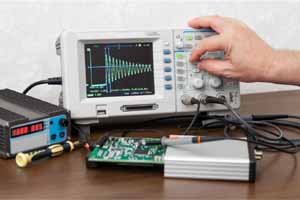In the rapidly evolving field of electronics, the demand for high-performance, versatile, and cost-effective testing solutions has never been greater. Traditional standalone test instruments are increasingly being replaced by modular and software-defined test systems, which offer unprecedented flexibility and efficiency. This article explores the evolution, benefits, and applications of these advanced test instruments in modern electronic design and manufacturing.
In the dynamic world of test and measurement (T&M), the advent of modular and software-defined test instruments is transforming how businesses approach testing and validation. These innovative tools offer unparalleled flexibility, scalability, and cost-effectiveness, making them indispensable in various industries. This article delves into the significance of these instruments in both the Indian and international markets, highlighting their business implications and future prospects.
The Rise of Modular and Software-Defined Instruments
Modular test instruments are designed to be highly adaptable, allowing users to customize and reconfigure their measurement setups according to specific testing requirements. This eliminates the need for multiple standalone instruments, reducing costs and saving space1. Software-defined instruments, on the other hand, leverage software to define their functionality, enabling users to update and modify their capabilities without changing the hardware2.
The Evolution of Test Instruments

Historically, test instruments were standalone devices, each designed to perform a specific function such as oscilloscopes for waveform analysis, spectrum analyzers for frequency domain analysis, or signal generators for producing test signals. While these instruments were highly effective for their intended purposes, they were often bulky, expensive, and limited in their scope of application.
The shift towards modular test instruments began with the development of systems like PXI (PCI eXtensions for Instrumentation) and VXI (VME eXtensions for Instrumentation), which allowed multiple test modules to be integrated into a single chassis. This modular approach enabled users to configure their test systems according to their specific needs, reducing both cost and physical space requirements.
The advent of software-defined instruments (SDIs) has further revolutionized the test and measurement landscape. SDIs leverage the power of software to define the functionality of test hardware. By decoupling the hardware from the software, SDIs offer unparalleled flexibility, allowing a single piece of hardware to perform multiple functions, depending on the software configuration. This not only reduces the need for multiple dedicated instruments but also enables rapid updates and upgrades through software alone.
Here are some real-world examples of modular and software-defined test instruments that are making significant impacts across various industries:
1. National Instruments (NI) PXI Platform
The PXI (PCI eXtensions for Instrumentation) platform by National Instruments is a popular modular electronic instrumentation platform used for building electronic test equipment and modular laboratory instruments. It allows for various RF test and measurement functions to be incorporated into one piece of equipment through replaceable or upgradeable software and hardware modules. This platform is widely used in industries such as telecommunications, automotive, and aerospace for tasks like signal analysis, data acquisition, and automated testing.
2. Keysight Technologies’ PathWave Software Platform
Keysight Technologies offers the PathWave software platform, which integrates design, test, measurement, and analysis. This software-defined platform allows engineers to customize and automate their test processes, providing flexibility and scalability. It is used extensively in the development and testing of 5G technologies, IoT devices, and advanced electronics.
3. Rohde & Schwarz R&S®SMW200A Vector Signal Generator
The R&S®SMW200A is a high-end vector signal generator that combines multiple functions into a single instrument. It supports a wide range of applications, including 5G, aerospace, and defense testing. The modular design allows users to configure the instrument according to their specific needs, and software updates can add new functionalities without changing the hardware.
4. Tektronix 5 Series MSO Mixed Signal Oscilloscope
Tektronix’s 5 Series MSO is a modular mixed signal oscilloscope that offers flexibility and scalability. It allows users to add or upgrade channels and features as needed. The software-defined nature of the instrument enables it to adapt to new testing requirements through firmware updates, making it a versatile tool for electronics testing and debugging.
5. Software-Defined Radios (SDRs)
SDRs, such as those developed by Per Vices, are used in various test and measurement applications. These radios can be reconfigured via software to perform different functions, such as signal generation, modulation, and demodulation. SDRs are widely used in telecommunications, signal intelligence (SIGINT), and electronic warfare (EW) for their flexibility and high performance.
Applications and Benefits

- Automotive: Ensuring the reliability and safety of advanced driver-assistance systems (ADAS) and electric vehicles (EVs) requires sophisticated testing tools like the NI PXI platform and Tektronix MSO.
- Telecommunications: The rollout of 5G networks necessitates precise and high-speed testing capabilities, which are provided by instruments like the Keysight PathWave and R&S®SMW200A.
- Aerospace and Defense: SDRs and modular signal generators are crucial for testing and validating complex systems in aerospace and defense applications.
Benefits of Modular and Software-Defined Instruments
1. Flexibility and Scalability: Modular test systems are highly configurable, allowing users to add or remove modules as needed. This makes them ideal for a wide range of applications, from R&D labs to production environments. As testing needs evolve, additional modules can be integrated without the need for entirely new systems.
2. Cost-Effectiveness:By leveraging modular and software-defined approaches, companies can significantly reduce capital expenditure. Instead of purchasing multiple standalone instruments, a single modular system with SDI capabilities can perform the same functions, often at a lower cost. Additionally, software upgrades extend the lifespan of the hardware, further enhancing the return on investment.
3. Space and Power Efficiency: Modular systems consolidate multiple test instruments into a single chassis, significantly reducing the physical space and power consumption compared to traditional setups. This is particularly beneficial in environments where space is at a premium, such as mobile test labs or compact manufacturing facilities.
4. Enhanced Performance and Accuracy:With advances in digital signal processing (DSP) and high-speed data converters, modular and software-defined instruments can offer superior performance compared to their traditional counterparts. They can deliver faster processing speeds, higher accuracy, and greater dynamic range, making them suitable for even the most demanding test scenarios.
5. Simplified Test Development:Software-defined instruments allow for the use of common development environments and programming languages, streamlining the test development process. Engineers can create, modify, and deploy test sequences quickly, reducing time-to-market for new products.
Applications of Modular and Software-Defined Instruments
The versatility of modular and software-defined instruments makes them suitable for a wide range of applications across various industries:
1. Wireless Communication: With the rapid development of 5G and IoT technologies, testing requirements have become more complex. Modular systems equipped with software-defined radios (SDRs) can be easily reconfigured to test different wireless standards, frequencies, and protocols, making them indispensable in the telecom industry.
2. Automotive: The automotive industry’s shift towards electric vehicles (EVs) and autonomous driving systems requires rigorous testing of electronic control units (ECUs), sensors, and communication systems. Modular test systems can be customized to simulate and test these components under various conditions, ensuring reliability and safety.
3. Aerospace and Defense: In aerospace and defense, where testing often involves high-frequency signals and harsh environments, the flexibility and robustness of modular and software-defined instruments are crucial. They can be used for radar testing, signal intelligence, and electronic warfare simulations, among other applications.
4. Semiconductor Testing: Semiconductor devices require precise and repeatable testing to ensure performance and reliability. Modular test systems can be tailored to handle various semiconductor testing needs, from wafer-level testing to final device validation.
Future Trends
As technology continues to advance, the trend towards modular and software-defined test instruments is expected to accelerate. Future developments may include the integration of artificial intelligence (AI) and machine learning (ML) to further enhance test automation and predictive maintenance. Additionally, the continued miniaturization of components and improvement in processing power will likely lead to even more compact and powerful test solutions.
Benefits of Modular and Software-Defined Instruments
- Flexibility and Scalability: These instruments can be easily adapted to meet changing testing needs. Businesses can scale their testing capabilities by adding or upgrading modules as required.
- Cost-Effectiveness: By reducing the need for multiple standalone instruments, modular and software-defined systems lower overall costs. They also minimize the space required for testing setups.
- Enhanced Performance: These systems offer high performance with low latency, high channel density, and bandwidth, making them suitable for a wide range of applications.
- Future-Proofing: The ability to update software and add new modules ensures that these systems remain relevant as testing standards and requirements evolve.
Impact on the Indian Market
India’s rapidly growing technology sector stands to benefit significantly from the adoption of modular and software-defined test instruments. The country’s push towards digitalization and smart manufacturing aligns well with the capabilities of these advanced T&M tools. Industries such as automotive, aerospace, and electronics can leverage these instruments to enhance their testing processes, improve product quality, and reduce time-to-market.
Moreover, the flexibility and scalability of these systems make them ideal for small and medium-sized enterprises (SMEs) in India, which often face budget constraints. By investing in modular and software-defined instruments, SMEs can access high-quality testing capabilities without the need for substantial upfront investments.
Global Market Trends
Globally, the market for modular and software-defined test instruments is experiencing robust growth. The increasing complexity of electronic devices and the proliferation of IoT applications are driving demand for advanced T&M solutions. Key industries benefiting from these instruments include:
- Automotive: Ensuring the reliability and safety of advanced driver-assistance systems (ADAS) and electric vehicles (EVs) requires sophisticated testing tools.
- Telecommunications: The rollout of 5G networks necessitates precise and high-speed testing capabilities, which modular and software-defined instruments can provide.
- Healthcare: Medical device manufacturers rely on these instruments to ensure compliance with stringent regulatory standards and to validate the performance of complex medical equipment.
Future Prospects
The future of modular and software-defined test instruments looks promising, with ongoing advancements in technology expected to further enhance their capabilities. Innovations such as artificial intelligence (AI) and machine learning (ML) are being integrated into these systems to automate testing processes and provide deeper insights into test data.
As industries continue to evolve and new testing challenges emerge, the adaptability and efficiency of modular and software-defined instruments will be crucial in meeting these demands. Businesses that invest in these advanced T&M tools will be well-positioned to stay ahead of the competition and drive innovation in their respective fields.
Conclusion
Modular and software-defined test instruments are revolutionizing the test and measurement landscape. Their flexibility, scalability, and cost-effectiveness make them invaluable assets for businesses in India and around the world. As technology continues to advance, these instruments will play a pivotal role in shaping the future of testing and validation, driving progress across various industries.
The shift towards modular and software-defined test instruments marks a significant evolution in the test and measurement industry. These systems provide the flexibility, scalability, and performance needed to keep pace with the rapid advancements in electronics. As industries continue to innovate, the adoption of these advanced testing solutions will be crucial in maintaining quality, reducing costs, and accelerating time-to-market. The future of test and measurement is undoubtedly modular and software-defined, promising to deliver ever greater efficiency and capability in the years to come.












